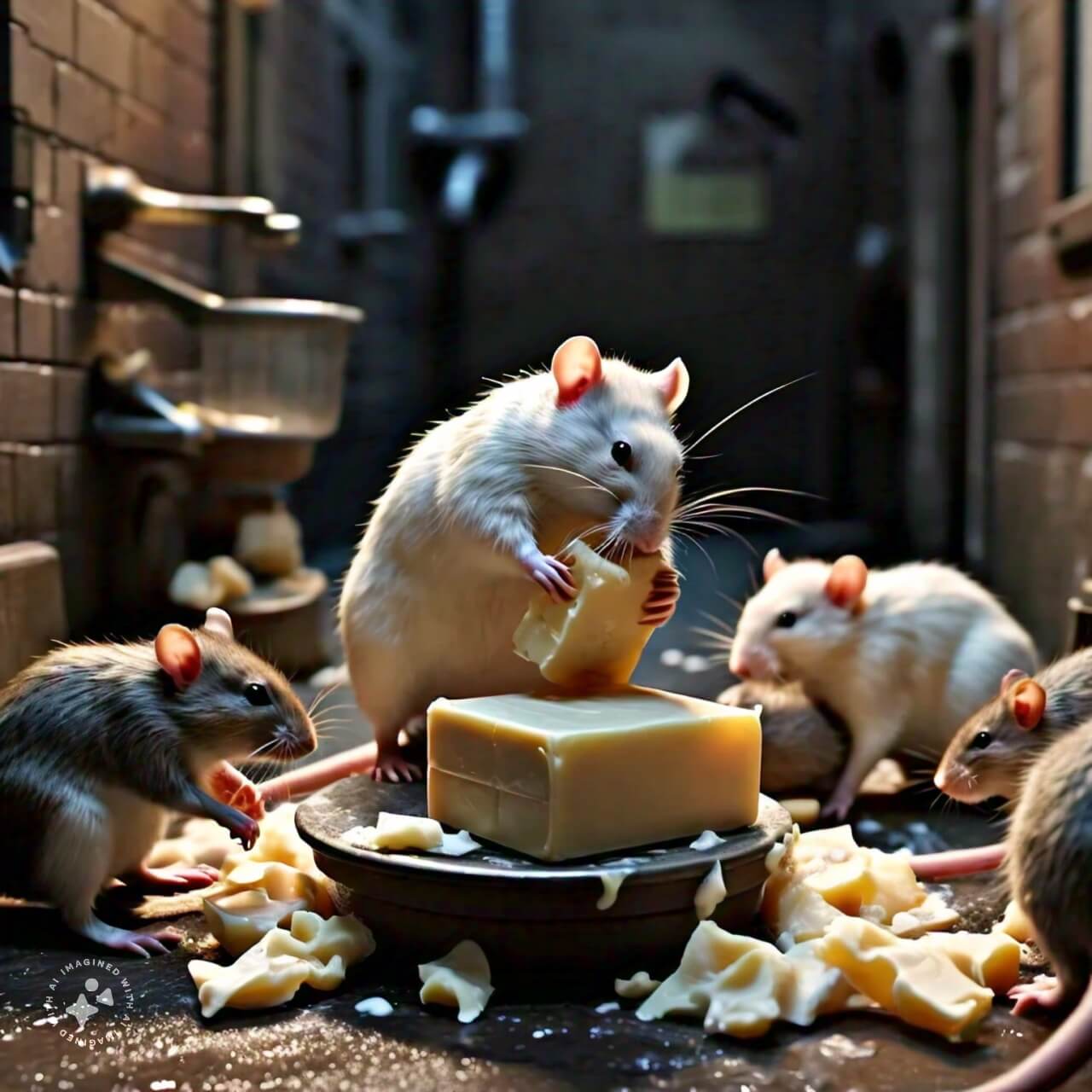Uncovering the Curious Habit: Why Do Rats Gnaw on Soap?
Rats are known for their sharp teeth and persistent gnawing habits. One particularly puzzling behavior is their tendency to chew on bars of soap. This article explores the reasons behind this odd behavior, the potential risks it poses to the rats, and how you can prevent it.
What Attracts Rats to Soap?
Rats chew on a variety of household items, and soap is no exception. The primary reason rats gnaw on soap is due to their innate need to keep their ever-growing teeth at a manageable length. Soap might also emit smells that mimic food or contain animal fats, which can be appealing to a rat’s sense of smell. Furthermore, the texture of the soap may provide a satisfying consistency for rats to chew on compared to harder materials that might risk damaging their teeth.
Is Eating Soap Dangerous for Rats?
While gnawing is a natural and necessary behavior for rats, consuming soap can be harmful. Soap is not food, and the chemicals and fragrances in it can be toxic to rats. Symptoms of soap ingestion in rats can include vomiting, diarrhea, and in severe cases, poisoning, which could be fatal. It is important for pet owners and households to understand these risks and keep soap out of reach of rodents.
How to Prevent Rats from Eating Soap
Preventing rats from accessing soap involves a few strategic approaches. First, ensure that soap bars are stored in closed cabinets or containers that rats cannot easily access. Using natural repellents like peppermint oil around areas where soap is kept can also deter rats. Additionally, maintaining general cleanliness and reducing clutter in your home can minimize nesting opportunities for rats, further reducing the risk of them coming into contact with soap and other potentially harmful substances.
Conclusion
The sight of a rat nibbling on a bar of soap can be both amusing and alarming. Understanding the reasons behind this behavior is key to managing it effectively. By ensuring soaps and other attractants are securely stored away and using deterrents, you can keep both your home and its unwelcome visitors safe.
The Attraction Explained: What Draws Rats to Soap Bars?

Rats are notorious for their ability to chew through just about anything they come across. But one peculiar habit that often baffles many is their attraction to soap bars. This article delves into the reasons behind this unusual behavior and explores what exactly draws these rodents to household soaps.
The Scent and Ingredients of Soap
One of the primary reasons rats are drawn to soap bars is their strong scent. Soap often contains various fragrances designed to mimic natural odors such as coconut, lemon, or floral scents, which can be incredibly enticing to a rat’s keen sense of smell. Additionally, some soaps include animal fats and oils, which rats can detect and are attracted to as potential food sources.
The Texture and Consistency of Soap
Rats have a natural instinct to gnaw to keep their constantly growing teeth at a manageable length. The soft and malleable texture of soap bars makes them an ideal target for this behavior. Chewing on soap can provide a satisfying experience for rats, much like biting into a chewy treat.
Nutritional Misconceptions
While it might seem odd, some rats may chew on soap bars due to a mistaken sense of nutrition. Although soap contains no nutritional value for rats—and is, in fact, harmful—their instinctual drive to chew and sample various objects can lead them to consume non-food items, including soap.
Preventative Strategies
Understanding that the fragrance and ingredients of soap attract rats can help in developing strategies to prevent them from accessing these household items. Keeping soaps in closed cabinets or using soap dishes with covers can deter rats from coming into contact with these products. Moreover, addressing other attractants in your environment can help reduce the overall rat population in and around your home.
In conclusion, the odd behavior of rats eating soap can be attributed to their powerful olfactory abilities and natural behaviors. By taking preventative measures and keeping soaps out of reach, you can protect your household items from becoming a rodent chew toy.
Risks and Remedies: Understanding the Impact of Soap on Rat Health
Introduction
Rats, often seen as mere pests, are complex creatures with behaviors that sometimes baffle even the most experienced pet owners or researchers. One such perplexing behavior is their tendency to chew on seemingly inedible objects, including bars of soap. This article delves into why rats engage in this odd behavior, the risks associated with soap consumption, and the remedies available to mitigate these risks.
Why Rats Chew on Soap
Rats chew on a variety of objects as part of their natural behavior to wear down their continuously growing teeth. Soap might attract rats due to its texture or scent, which could be perceived as a food source or a gnawing opportunity. Understanding this behavior is crucial in assessing the risks and determining the appropriate remedies.
Health Risks of Soap Consumption in Rats
Consuming soap poses several health risks to rats, primarily due to the chemical ingredients found in most commercial soaps. These can include detergents, fragrances, and other potentially toxic compounds that can lead to:
- Digestive Issues: Soap can disrupt the rat’s digestive system, causing symptoms like diarrhea or vomiting.
- Chemical Poisoning: Certain chemicals in soap can be toxic if ingested, leading to more severe health issues, including organ damage or failure.
Preventative Measures to Protect Rats
To prevent rats from chewing on soap, rat-proofing areas where soap is stored is essential. Consider these strategies:
- Secure Storage: Keep soap in closed cabinets or containers that rats cannot access.
- Alternative Gnawing Options: Provide safe chewing alternatives like untreated wood blocks or chew toys designed for rats.
Remedies for Soap Consumption in Rats
If a rat consumes soap, the first step is to remove any remaining soap from the rat’s environment. Following this, closely monitor the rat’s health and consult a veterinarian if any signs of distress appear. Supportive care, depending on the symptoms and severity, may include:
- Dietary Adjustments: Providing a bland diet to soothe the digestive system.
- Hydration: Ensuring the rat remains well-hydrated to help flush out toxins.
Conclusion
While it may seem unusual for rats to eat soap, understanding the reasons behind this behavior and the associated risks can help pet owners and researchers ensure the safety and health of these curious creatures. With the right preventative measures and remedies, risks can be significantly minimized, leading to a safer environment for rats to thrive.
Preventative Measures: How to Discourage Rats from Eating Your Soap
Rats have a notorious reputation for chewing on just about anything they can get their tiny paws on, including household soap. While it may seem peculiar to us, there are reasons why rats are drawn to soap bars. However, their gnawing habits can cause inconvenience and even health concerns. In this article, we’ll explore effective strategies to keep rats away from your soap, ensuring a cleaner and safer home environment.
Understanding the Attraction
Why do rats eat soap? Often, it’s the fatty substances in the soap that mimic food sources. Understanding this can help in addressing the problem more effectively. By knowing what attracts rats, homeowners can take targeted actions to make soap less appealing or accessible to these rodents.
Secure and Store Soap Properly
One simple yet effective measure is to securely store your soap. Rats are less likely to get to the soap if it’s in a closed cabinet or a rat-proof container. Consider using sealed plastic containers or metal boxes which rats cannot easily gnaw through. Keeping soap bars out of reach can significantly reduce the likelihood of rat infestations.
Use Rat Repellents
There are several natural repellents that can deter rats. Ingredients such as peppermint oil, citronella, and eucalyptus are known to repel rats due to their strong scents. You can soak a few cotton balls in these essential oils and place them near areas where you store soap. Additionally, commercially available ultrasonic rat repellents emit a high-frequency sound that is unpleasant to rats but not harmful to pets or humans.
Maintain General Cleanliness
Rats are attracted to mess and clutter because it provides them with numerous hiding spots. Maintaining cleanliness around your home can discourage rats from settling in. Ensure that crumbs and spills are cleaned up promptly, trash is disposed of regularly, and that there is no accessible food left out overnight. This will make your home less inviting to rats looking for food sources, including your soap.
Seal Entry Points
Preventing rats from entering your home is crucial. Rats can squeeze through small gaps, so it’s important to seal cracks and openings around doors, windows, and foundations. Use materials like steel wool, metal sheeting, or specially designed seals that rats cannot chew through. Regular inspections for new gaps or holes are essential, as rats can create new entry points over time.
Professional Pest Control
If rat infestations are severe or continual, it may be wise to consult with professional pest control services. Professionals can offer more permanent solutions such as bait stations or traps, and they can help identify and seal potential entry points you might have missed.
In conclusion, keeping rats away from eating your soap involves a combination of proper storage, using natural repellents, maintaining cleanliness, sealing entry points, and possibly seeking professional help. By implementing these strategies, you can protect your home from unwanted guests and ensure that your soap remains just for your use.




